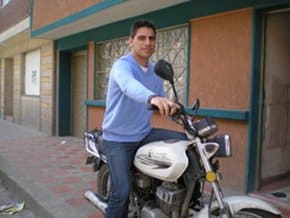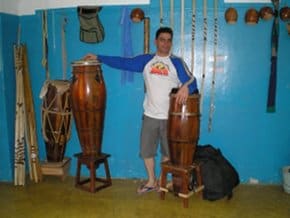A massage therapist manipulates the soft tissues of a client’s body in order to decrease stress, treat injury and promote health and well-being.
The health benefits of massage have been known for centuries.
Writings on the subject have been found in many of the world’s ancient societies including ancient China, Greece, India, Mesopotamia and the Khmer Kingdom (South East Asia).
Massage in the UK became popular in the late 1800s after the techniques developed by Per Henrik Lings in Sweden became popular in the English speaking world.
Lings is the forefather of modern Physical Education curriculum (PE or PT), of which remedial massage was only a small part.
In the UK today, both highly specialised and foreign massage disciplines are becoming increasingly available as massage’s health benefits are further recognised by the medical establishment and embraced by the press.
The most popular forms of massage today are:
- Swedish massage – sometimes known as body massage this is based on techniques of kneading the muscles with hands and elbows in order to decrease tension and flush toxins through the body’s lymphatic system.
- Sports massage – requiring a greater level of skill and study, this aims to remedy sporting injuries, improve recovery after an event, or prepare an athlete for competition.
- Head massage – the head, neck and shoulders are targeted to decrease the tension and anxiety that can lead to headaches or stress.
- Thai Massage – an ancient system of massage that is hugely popular in Thailand and South East Asia.
It involves assisted stretching as well as vigorous, deep-tissue massage and pressure point work. - Structural Integration – sometimes known as Rolfing, this is a practice based on the theory that mind and body are not separate entities but inextricably connected and every mental neurosis is mirrored in a corresponding physical dysfunction.
The technique is based upon the findings of the radical psychoanalyst William Reich, a student of Sigmund Fred and was developed by Ida Rolf in the 1960s.
Salary
Many massage therapists are self-employed and earn a fixed fee per treatment.
The more clients they have on their books, the greater their earnings.
As their experience and reputation grows, they can charge more per treatment.
- A massage therapist starting out may earn from £12,000 – £18,000 per annum.
- An experienced massage therapist with a large client base can earn from £22,000 – £30,000 per annum.
- A highly recommended, expert massage therapist working regularly can earn up to £50,000 per annum.
Responsibilities
A massage therapist has the following daily duties and responsibilities:
- Meeting with clients and taking a detailed cases study
- Employing the various techniques of massage based on the client’s medical history and physical state of being
- Planning a course of treatment based on the client’s symptoms and reaction to treatment
- Keeping detailed patient records
- Referring to another medical health practitioner like a GP or physiotherapist when necessary
Qualifications
To work as a massage therapist in the UK practising full body, head and neck or sports massage you will need to take a course and examinations set by one of the nationally recognised bodies VTCT, CIBTAC or ITEC.
Courses generally take a year part-time or there are condensed full-time alternatives .
To gain entry to a course you may need to have a few GCSEs, one of them in Biology or Science.
Other massage disciplines have their own awarding bodies and training institutes.
All massage courses will contain the following elements:
- Anatomy and physiology
- Massage techniques
- Patient care
- Administration
- Diagnosis and assessment
- The effects of massage
- Contra-indications
Skills
A massage therapist should work on developing the following personal characteristics:
- A calm and empathetic nature
- The ability to inspire confidence and set others at their ease
- Physical endurance, since giving an hour long massage is very demanding
- Smart appearance and a high standard of personal hygiene
- Good organisational and book keeping skills
- Manual dexterity
Working Conditions
Massage therapists usually work in a clinical setting within an alternative medicine clinic, or a sports rehabilitation clinic alongside other practitioners such as physiotherapists or osteopaths.
The basic tool of massage is a massage bed.
These come in portable versions so that clients can be visited in their own homes.
Massage chairs are also frequently employed in on-site massage, at an office or special event for example.
For the application of massage, special oils are used, most commonly the neutral smelling and chemically stable walnut oil.
Hours can be long in order to treat clients outside working hours; early morning and evening treatment sessions are common as are weekends.
Massage is extremely tiring for the practitioner, so good technique and working posture must be maintained in order to work efficiently.
Massage therapy although hard work, is a very rewarding career and the sense of achievement gained from helping people to relax and overcome injury is cited as one of the main reasons people continue to practise.
Experience
Within a massage therapy course, a huge part of the curriculum is hands-on study.
Students are usually required to perform massage on each other right from the outset.
As ongoing training they are also required to perform coursework outside of class in the form of case studies – private trial patients whose treatment is logged and submitted for approval.
As such, students gain valuable insight into what it is like to be a patient and more importantly on how to give a massage.
Additional experience in a client facing or caring role, such as charity work or counselling, could also be beneficial as well as any experience running a small business or promotional work.
Employers
Physiotherapy, sports or alternative medicine clinics are the biggest employers of massage therapists.
Alternatively some therapists work on their own and advertise in health food shops, on the Internet and in local sports facilities.
Career Progression
Massage therapists can improve their job prospects and earning potential by becoming more qualified.
Moving from Swedish massage to Deep Tissue or Sports, for example, opens up a new potential client base.
The experience gained as a massage therapist is also invaluable to anyone going on to become medically qualified as an osteopath, physiotherapist or TCM practitioner.
Further years of study are required in these cases.
Also known as…
- Masseur
Related Jobs
What’s it really like?
Giuseppe Laminoca Capello, 33, is a sports massage therapist working in London.
How long have you been working in the massage industry?
For seven years now. I qualified in 2002 from the London School of Sports Massage.
My course took around twelve months. It was an excellent course; you learnt about sports injuries, prevention and cure.
I started to work as a massage therapist part-time for a health club, and did that for around two years, working in two or three different places between full and part-time.
After that I started to work as a volunteer for triathlons and marathons like the London Marathon and I worked for a couple of years at the Fulham Rugby Club in a paid role.
Now I work at a clinic called Phisio in The City two days a week, on Tuesdays and Thursdays, and I work in a health club in Knightsbridge, which is a members only club.
Most of the clients I get are because the clinic is associated with The Serpentine Running Club and the London Marathon, so mostly I’m treating people with sports injuries.
What did you do before this job?
I worked in the hotel industry as a duty manager at a hotel in London.
I have a degree in Hotel and Catering from Italy.
Back then I worked around the world in Italy, France, Dubai and ended up in London where I did a sports science course, a foundation degree.
What do you do in a typical day at work?
I come to the clinic and get the schedule for the day from the receptionist; she gives me the bookings for the day.
I get some notes about the clients, read them, then I have a briefing from the physiotherapist in the clinic to find out about the client – if they are recovering from an operation, or had a recent injury, that kind of thing.
Then I meet the client, make a quick assessment and then we treat.
Usually I see about four clients a day.
Most of them are training for a triathlon or have recently done a marathon.
Sometimes their muscles are fatigued rather than having a specific injury.
They may have done endurance running for three days so their muscle is full of scar tissue repairing itself from micro-trauma, so that requires a specific type of treatment.
This is maintenance and prevention rather than cure.
What do you like about the job?
I like working with my clients; I think that I am a part of their goals and training.
I am doing a bit of their own training by working with them, advising them, helping them, and working together.
As I am very into sports myself I enjoy this aspect a lot.
I am also deeply interested in the human body, its mechanics and how it works.
It is fascinating and I’m always learning more about it.
What do you dislike about the job?
When there are too many clients to work with in a very short time it can be frustrating and I don’t like to limit the work I need to do on any one client.
What advice would you give to someone thinking of doing this job?
You must like people and be able to get along with them.
If you want to become a multimillionaire don’t do this job.
You can become successful, you can work in a nice environment like the Olympic games; those kinds of things are nice.
What job do you think you might do after this role in terms of career progression?
Most probably I will open my own clinic where I can do not just sports massage but fitness, and personal training, a studio type of thing where you can come and train and be treated too.
What other inside-information can you give to help people considering this career?
It’s hard work, and you have to be dedicated.
Do you mind us publishing your salary – this is very helpful for job seekers?
If I have a really good month with a few private clients I can average about £2,000 but usually I earn less than that.
On a bad month I can go as low as £1,200.










